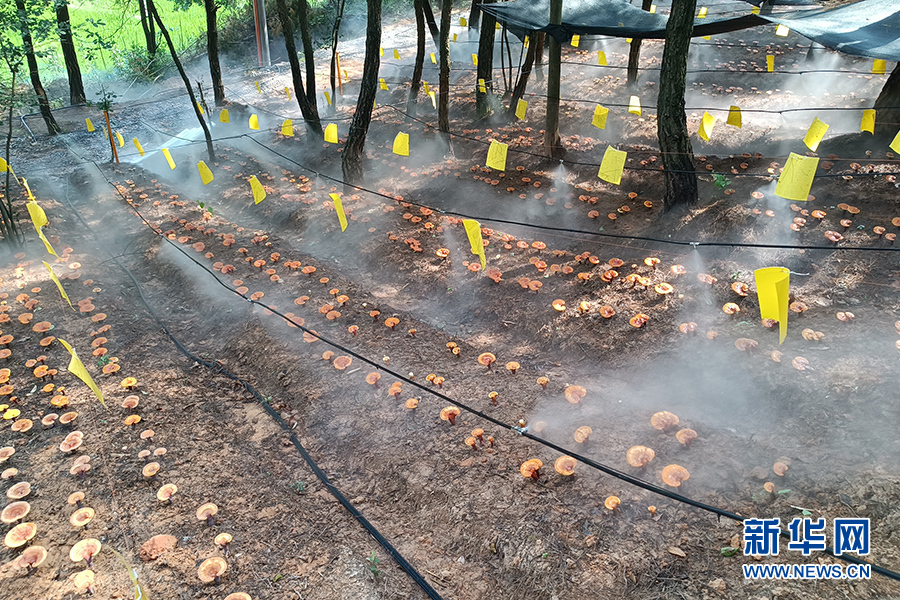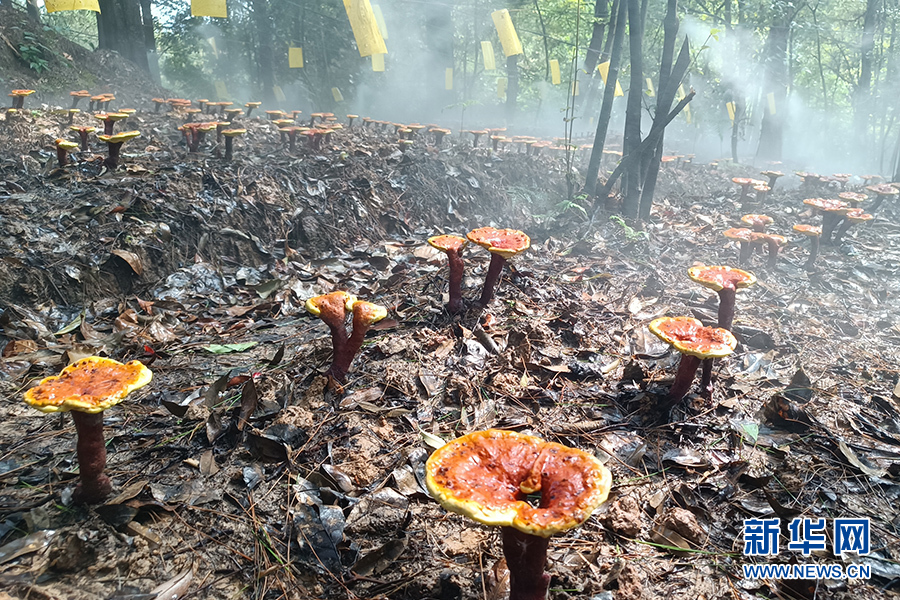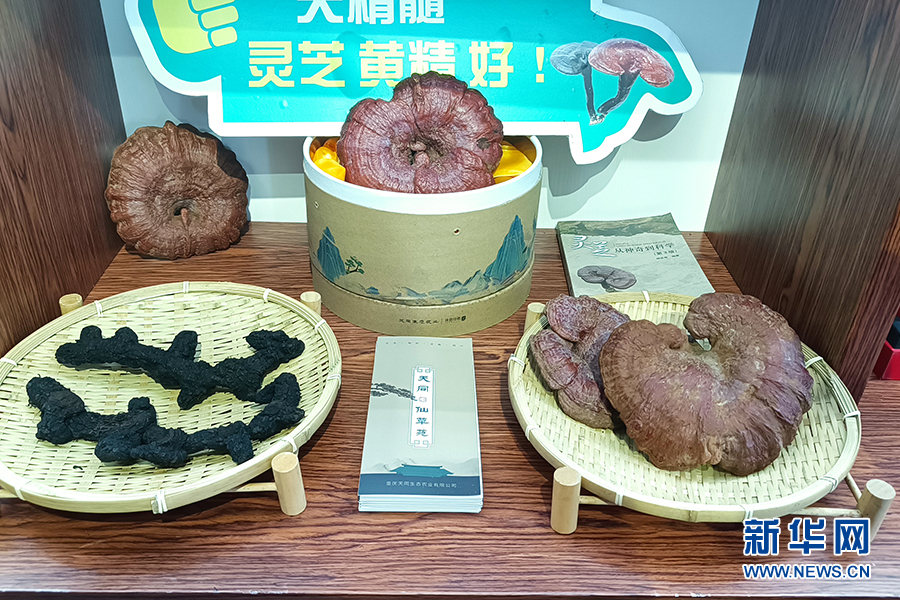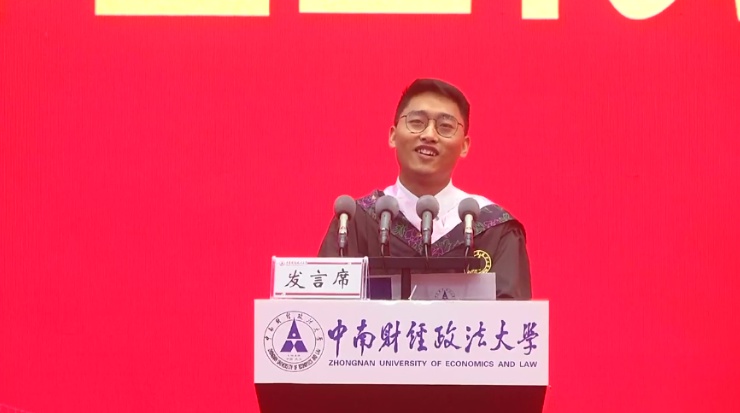[On the field of hopes] Chongqing Fuling: Forest underworld medicine does not take up the fields without cutting trees and get rich
Author:Xinhuanet Time:2022.07.15

In the Ganoderma plantation of Xinxing Village, Dushun Town, Fuling District, Chongqing, the Wisdom Ganoderma Misti System continued to spray water fog to quench thirst for the growth of Ganoderma lucidum. Xinhuanet Han Menglin Photo
Xinhuanet, Chongqing, July 15th (Han Menglin) Under the high temperature of nearly 40 ° C, a lot of ganoderma in the Ganoderma Lingzhi Planting Park did not feel "thirsty". On the slope of Ganoderma lucidum, the Wisdom Ganoderma Misty System continues to spray water fog to explain the growth of Ganoderma lucidum to quench thirst, and always maintain a moist growth environment.
This is a scene of the online theme event of "On the field of hope -rural rejuvenation to the west" on July 13th.
"The spray irrigation system has the function of integration of water and fertilizer, which can meet the moisture and nutrient needs of Chinese medicinal materials. In the summer and drought years of the year, it plays a vital role in the growth of Chinese medicinal materials under the forest." According to the person in charge of Xingxing Village Tian Tongxian Caoyuan Planting Base, the spray irrigation system transports nutrients through the pipe network, and "supply on demand" according to the growth of Chinese medicinal materials to achieve quality increase and production.
At the cultivation base of the Chinese herbal medicine planting in Tiantong Xiancao Garden, the yellow essence of the mountains is like a "green gold mine". The person in charge of the base said that the forest of the village is good. The forest vegetation can be moisturized for the seedlings of traditional Chinese medicine seedlings. This "restoration of wild cultivation" under forest planting Chinese medicinal materials neither takes up farmland nor cutting tree vegetation, protecting the green mountains and green mountains, and realizing Jinshan Yinshan.
"To promote the comprehensive revitalization of rural areas with industrial revitalization, we adhere to the road of industrial ecology and ecological industrialization." Said Xin Peichang, mayor of Dashun Town, Da Shun Town, Fuling District. According to reports, Dushun Town makes full use of the excellent ecological conditions in the jurisdiction, relying on Tai Chi Group Co., Ltd. and Chongqing Tiantong Ecological Agriculture Co., Ltd. to vigorously develop the cultivation of Chinese medicinal materials such as Hu, Golden Buckwheat, Hou Pu, Ganoderma, Huang Jing, Dendrobium, planting, planting, planting, planting, planting. The area remains over 65,000 acres throughout the year, and the planting area accounts for about 80%of the planting area of Chinese medicinal materials in the region, and the annual output value exceeds 40 million yuan.
On the basis of large -scale planting, Dushun Town also explored the path of integrating the integration of Chinese medicinal materials, one, two, and three industries. This year, after the two Chinese medicinal materials processing plants invested in about 50 million yuan in Dishun Town will form a processing capacity of 15,000 tons of annual output, the output value is expected to reach about 1 billion yuan. In the development of tourism integration, the town also plans to build a Dashun Pharmaceutical Botanical Garden of about 1,600 acres, creating a rural complex that integrates centralized medicinal materials, science popularization, tourist tourism and leisure tourism.
According to Xin Peichang, the traditional Chinese medicinal materials industry in Dashun Town has strongly promoted the improvement of agricultural quality and efficiency in the town, drove farmers to increase their income and become rich, and lay a solid foundation for consolidating the results of poverty alleviation and solidly promoting rural revitalization. Xia Yizhong, general manager of Chongqing Tiantong Company, said that the planting process of Chinese medicinal materials requires a lot of manual care. At present, nearly 50 villagers have been hired in the planting base, and they have also created the opportunity to increase their income at home.
In 2018, the company established a "shared farm" through the "three changes" reform of the homestead. "I used to do zero workers at home. I earned up to more than 1,000 yuan a month, and the economic pressure was great. Later, I went to shared farm workers, and the annual income increased from more than 10,000 yuan to more than 70,000 yuan. You can also take care of the house. "Xia Xingfang, a local villager, said happily.
It is understood that the Fuling District of Chongqing also draws a blueprint for the development of the characteristic of the characteristics of the traditional Chinese herbal medicine industry. The district will deeply cultivate the planting industry of Chinese medicinal materials in 17 towns and villages in Dishun, Lixian, Tongle, and Longtan. When it reaches 100,000 acres, it has built the country's largest golden buckwheat, former Hu, and Perilla plantation base. A large -scale forest medicine planting base for yellow essence and 藿 藿 建 建, forming a forest economy with "not cutting trees and becoming rich", and realizing "green mountains and green mountains is Jinshan Yinshan".

The ganoderma lucidum is cultivated in the Linxia Ganoderma planting park in Xinxing Village, Dushun Town, Fuling District, Chongqing. Xinhuanet Han Menglin Photo

Chinese medicinal materials displayed in Dashun Town "Sharing Farm". Xinhuanet Han Menglin Photo
- END -
Looking back on the way to study, the Yi guy's graduation thesis thanked more than 6,000 words

The Yangtze River Daily Da Wuhan client June 16 (Reporter Zhang Weina) On the morn...
Weihai City takes the lead in implementing the "one -code association" application of non -production unit code in the whole area
Volkswagen · Poster reporter Chen Tingru, correspondent Xue Qingguo Weihai, reportIn order to further optimize the business environment and improve administrative efficiency, recently, the Weihai Nat